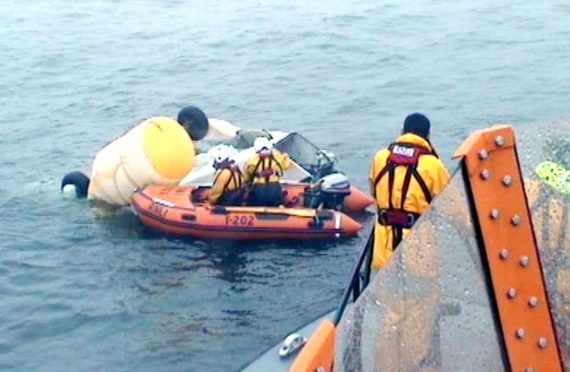A survivor of the horror Shetland helicopter crash – in which four people died, and a fifth later committed suicide – spoke how submersive training he undertook in Norway was “much more rigorous” than the UK equivalent.
Neil Ritchie, 39, had been a wireless operator who had experience hundreds of helicopter flight to rigs and platforms – but told a fatal accident inquiry investigating the circumstances of the tragedy that he has never flown offshore again since the “nightmare” events on 23 August 2013.
Mr Ritchie – who still works for his employer at the time, Baker Hughes, but onshore in a warehouse – described the differences between the training he undertook in Britain and Norway.
He said: “The training in Norway was more rigorous [than in the UK].”
For the training in Britain he said offshore workers did three submersive simulations in a pool, but in Norway it was around five – including involving a wave machine “to make it more realistic”.
He added that the Norway training involved “doing it in the dark”.
Asked by Sheriff Principal Sheriff Derek Pyle – who is conducting the inquiry – whether the Norwegian training had helped him survive, he replied: “Quite possibly.”
He added: “I think how the Norwegians were doing it was better, more realistic. It makes sense to me and seems logical.”
Mr Ritchie then described the events leading up to the tragedy and the moments after in which he and other passengers were rescued.
He said: “There had been delays that day and a lot of us weren’t that hopeful the flight was going to come. But in the end we did get off the rig of course … unfortunately.”
Mr Ritchie boarded the Super Puma helicopter on the Alwyn North platform, which then went to the Borgsten Dolphin rig to drop off and collect more passengers.
On the return flight to Aberdeen they were told there would be doing a refuelling stop at Sumburgh Airport in Shetland.
He said: “We were told we would land at Sumburgh in 10 minutes. Ten minutes came and went. I stopped reading my book and looked out of the window. It was a bit foggy. The helicopter started to slow down and we could feel it drop in height.
“After that there was a lot of vibration. Some people described it as a crack. A lot of people were sleeping and a few jumped up.
“It sounded like something tearing itself to bits. At the time I thought the gearbox had gone.
“I could see the pilot on the right hand side and he was pulling on his stick and looking at the other pilot. From that point I knew there was only going to be one outcome.”
He said there was no warning given for passengers to “brace” upon impact.
Mr Ritchie said: “You felt the impact and then next thing is you are under water. We were immersed right away, I was quite panicked.
“I remember how clear the water was inside the helicopter.”
He described how he was unable to operate his “rebreather” and accidentally activated his lifejacket inside the chopper.
He added: “I gave up on the rebreather and I was fighting againt the buoyancy of the life vest. I floated up to what was now the floor.
“I saw legs going out of a window on the opposite side and I thought that would do for me. I had to squeeze the life vest through the window. It took me a bit of time to get out, what seemed a time to me.”
Mr Ritchie said he reached the surface and smelled fuel and made his way from the helicopter to a group of other survivors.
He said one had obviously broken his back “screaming in agony”, others were in shock shouting and screaming, while he also witnessed one body float away.
However, he added: “In the end the waves split us up. With the fog it was a bit dusky. The waves were huge. You could see the helicopter one second and away the next.”
Mr Ritchie said a rescue helicopter arrived on scene and airlifted one person before collecting him and then another, whose survival suit had been filling with water and he helped the rescue crew lift him into the chopper’s door.
They were flown to Sumburgh, just two miles away, and taken to Gilbert Bain Hospital in Lerwick.
At that time Mr Ritchie said he had been “pretty shaky”, adding: “I took my survival suit off and realised I was bone dry. Even my cigarettes were dry so I started smoking profusely.
“I was pretty much unscathed. In the grand scale of things I was pretty lucky.”
Asked about his mental health now, he replied: “Most people looking from the outside would think I was doing quite well. But that is not the case. No one in that situation would ever be the same.
“I have not been offshore again. I have got a son and daughter.”
